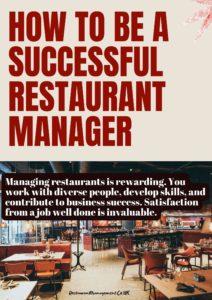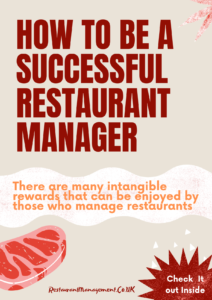Successful Restaurant Manager
A career as a Restaurant manager is a very demanding role that requires a great deal of skill and experience. To be a successful restaurant manager, you will be responsible for everything from the guests’ experience to the overall running of the business.
As a successful restaurant manager, you will need to have a great deal of knowledge about food and alcohol, as well as strong organizational skills. You will also need to be able to manage a team of people and be able to handle crisis situations.
If you are interested in pursuing a career in restaurant management, it is advantageous to have a degree in business or a related field. However, the profession of restaurant management does not require specialized knowledge in the field.
Although having a degree is not required to work in the restaurant industry, some companies may favour candidates who do have one. All that is required to be a successful restaurant manager is a high level of education together with exceptional managerial skills.
A Level 3 Diploma in Hospitality Supervision and Leadership or a Level 4 Diploma in Hospitality Leadership is a great place to start and will make for an excellent foundation. Also, another route is to take the Bachelor of Arts degree in Hospitality Management which will equip you with the information and skills you need to succeed in an industry that employs over 1.3 million people.
An important part of being a restaurant manager is to have a strong understanding of F&B. In addition to having a good knowledge of dishes and ingredients, a restaurant manager must also be skilled in problem-solving, organizational, and communication skills.
Ultimately, he or she should be able to inspire employees and keep them motivated. And he or she must be willing to listen to them and address any questions that may arise. This is the only way to be successful in the industry of restaurant management.

The Role of a Restaurant Manager
The role of a restaurant manager is to ensure that their customers have a positive dining experience. This means keeping your restaurant clean and organized, staffing your waiting staff appropriately, and ensuring that your food is of the highest quality. A good restaurant manager also makes sure that the overall business is running smoothly, and takes care of any customer complaints or concerns.
In short, a successful restaurant manager is responsible for everything from the food on the plate to the atmosphere in the dining room as well as managing all aspects of the business to maximize profits and minimize expenses.
This requires generating budgets, analysing financial analytical reports, and establishing KPIs and metrics. For example, managers need to monitor the number of items sold each day, the amount of labour spent per week, and the cost of inventory.
Other key areas of running a restaurant include Cost of Goods Sold (COGS) and labour costs analysis. These costs fluctuate constantly, and a good restaurant manager has to continually figure them out. The key is to find ways to reduce these expenses while maintaining a quality customer experience.
A restaurant’s operating expenses are divided into fixed and variable costs. Some costs are fixed and never change, such as rent and taxes. Others are variable. They can include food, utilities, and employee salaries. Some are seasonal, while others fluctuate. The most important factor to consider is the percentage of sales that must be made to break even. To do this, the manager must have a mix of high-cost and low-cost menu items.
Overhead is another important area of restaurant management. The majority of restaurant costs are derived from labour and food. These costs are often divided into two categories: Controllable and Non-Controllable. Both types of expenses are also categorized as Fixed and Variable.
In addition to these two categories, restaurants must also manage the staff culture and must be aware of the overall budget to avoid any unexpected expenses.
The costs of operating a restaurant vary. Typically, the costs of supplies and labour make up COGS. However, food and labour are separate costs. Some restaurants track their labour separately by department, while others use the total cost of the restaurant. If these factors are not properly controlled, their profits will suffer.

The most critical aspects of running a restaurant are its menu, personnel, and profit margin. All these factors will affect the profitability of the business.
The following are all part of the responsibilities of a restaurant manager:
- General Management
- Administration
- Customer Service
- HR & Staff management
- Supply chain/purchasing
- Health and safety at work
- Regulatory compliance
- Accounting
- Marketing

The Challenges of Restaurant Management
When it comes to managing a restaurant, there are a lot of challenges that restaurateurs face. As a restaurant manager, you are responsible for everything from the food to the décor to the employees. It can be a difficult job, but with the right attitude and some careful planning, you can make it a success.
Some of the most common challenges include:
- Finding and retaining quality staff
- Managing finances
- Creating a menu that meets the needs of diners
- Ensuring cleanliness and sanitation
- Developing and maintaining a positive customer service attitude
With the right strategies and techniques, restaurateurs can overcome these challenges and ensure that their restaurants are a success.
Managing Your Team
To run a successful restaurant, managers must be transparent with their employees. Involve your employees in the decisions that affect the operation of the restaurant, and be willing to communicate with them in a way that they will be comfortable with.
Furthermore, a good manager must be flexible and adaptable to changes in the industry. You must be willing to adjust to the changing needs of your staff and must create a great working environment, invest in training and make your staff feel appreciated and valued.
Among the main challenges of a restaurant, recruitment is the number one challenge. Hence, good managers should be proactive in this regard and focus on making the staff feel valued and happy.
The best way to recruit and retain employees is to provide them with opportunities for growth and development. Taking the time to review their performance regularly can increase employee morale and increase the company’s bottom line. A daily walkthrough will allow you to see the progress made in their work and how they can improve the business.
Related articles:
How To Improve Restaurant Profits
Restaurant Management Structure
The Rewards of Restaurant Management
In many ways, being a successful restaurant manager is a lot like being a successful business owner. You have to be organized and have a plan for each stage of the business. You also have to be able to handle a lot of different situations and be able to keep your customers happy.
There are many rewards for those who manage restaurants well. These rewards can include a sense of satisfaction from seeing customers happy and satisfied, the satisfaction of knowing that the restaurant is running smoothly and efficiently, and the satisfaction of knowing that you are helping to support a local community.
Some of the most common rewards for restaurant management include:
- A salary that is commensurate with experience and skills
- A flexible work schedule that allows for evening and weekend work
- Opportunities for advancement
- Recognition from colleagues and customers
- A sense of responsibility and ownership
There are also many intangible rewards that can be enjoyed by those who manage restaurants well including being able to work with great team teams, being part of a community and being able to help people enjoy their food, can make a lot of money and finally, if you are successful, you can also become a respected member of your community.

(FAQ’s) Frequently Asked Questions And Answers
What makes you a good restaurant manager?
Being a good restaurant manager requires a blend of various skills and qualities. Firstly, strong leadership is essential in inspiring and motivating your team to perform at their best. Effective communication is necessary for any business’s smooth operations and excellent service. Communicating with staff and customers is crucial to ensure that everything runs seamlessly.
Additionally, organisational skills are vital for efficiently managing inventory, schedules, and finances. Adaptability is crucial in the fast-paced restaurant environment, as things can change quickly, so being able to think on your feet and problem-solve is a must. Lastly, having a passion for hospitality and a commitment to providing a positive guest experience sets apart a good restaurant manager.
What are the 3 responsibilities of a restaurant manager?
Staff Management: A restaurant manager is responsible for hiring, training, and supervising staff to ensure they provide excellent customer service, creating work schedules, delegating tasks, and addressing any performance issues.
Operations Management: Overseeing the restaurant’s day-to-day operations is another critical responsibility, Which includes managing inventory, ordering supplies, and ensuring that the kitchen and dining areas are clean and well-maintained. Restaurant managers also handle administrative tasks such as budgeting, payroll, and record-keeping.
Customer Service: Ensuring customer satisfaction is paramount. Restaurant managers must greet and interact with guests, handle complaints or concerns, and strive to create a positive dining experience. They may also be responsible for developing and implementing marketing strategies to attract and retain new customers.
What is the key skill for a restaurant manager?
While many skills contribute to success as a restaurant manager, one essential skill stands out: communication. Effective communication is vital to building solid relationships with both staff and customers. A restaurant manager must convey employee expectations, provide feedback and guidance, and address issues. Good communication also involves active listening, understanding the needs and concerns of both staff and customers and responding appropriately. A restaurant manager can create a positive work environment and ensure customer satisfaction by fostering open and transparent communication.
What every restaurant manager should know?
Every restaurant manager should have a solid understanding of several key areas to run a successful establishment effectively:
Hospitality Industry: It’s crucial to have a comprehensive knowledge of the hospitality sector, which includes the latest developments, client choices, and industry laws.
Food Safety and Hygiene: Ensuring food is prepared, stored, and served safely is paramount. Restaurant managers should know food safety standards and regulations to prevent foodborne illnesses and ensure compliance with health codes.
Financial Management: Good financial management of a restaurant is crucial for its profitability, and it includes budgeting, cost control, pricing strategies, and economic analysis to optimise revenue and minimise expenses.
Employee Management: Building and leading a strong team is crucial to success. Restaurant managers should know how to recruit, train, motivate, and retain talented staff and handle performance issues and conflict resolution.
Customer Experience: Attracting and retaining customers requires providing exceptional customer service. Restaurant managers should focus on creating a welcoming atmosphere, resolving customer complaints promptly, and continuously seeking ways to improve the dining experience.
By mastering these areas, restaurant managers can effectively navigate the industry’s challenges and lead their teams to success.


